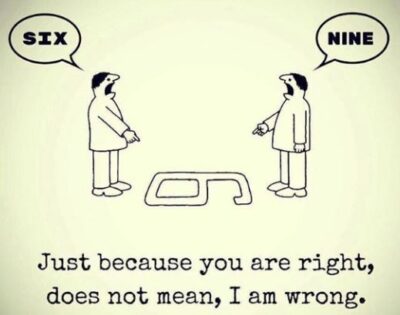A dearly departed friend used to sign off his morning drive-time radio show with the same advice every broadcast: “Never argue with a crazy person.” From my view of the world today, this advice has never been more apropos.
Recognizing that there are different perspectives in life is critically important to … well, getting by and getting along. Sadly, there seems to be less and less embracing of the notion that similarities and differences actually do exist from person to person these days. We have largely forgotten that all of life is a conversation and that civil dialogue and compromise stand the best chance of keeping the peace and getting anything done.
A Little Perspective, Like a Little Humor, Goes a Long Way
 Perspectives are the genesis of our past experiences plus our initial glance at or understanding of something. Whether considering family members, co-workers, competitors, those whom we put in the halls of congress, or just plain old acquaintances, it’s important to consider your perspective and the opposing person’s perspective before jumping into debate headed toward potential dustup. Ditto, by the way, if you’re trying to get something accomplished. (Hint, hint, see Washington, DC.)
Perspectives are the genesis of our past experiences plus our initial glance at or understanding of something. Whether considering family members, co-workers, competitors, those whom we put in the halls of congress, or just plain old acquaintances, it’s important to consider your perspective and the opposing person’s perspective before jumping into debate headed toward potential dustup. Ditto, by the way, if you’re trying to get something accomplished. (Hint, hint, see Washington, DC.)
Perspective helps us understand situations from other positions, consider different beliefs, experiences and viewpoints, and generally appreciate where someone is coming from. Doing so gives us a better grasp and greater empathy. Learning from different perspectives allows us to overcome the fear of being wrong and helps others understand us. Moreover, appreciation for someone’s unique frame of reference reduces bias, judgment and, potentially, conflict.
It takes effort. Effort that too often these days isn’t exerted.
Wackadoodle
 In this day and age, it’s certainly possible that the person with whom you are about to wrangle is well beyond obstinate and just plain wackadoodle — hence the accuracy of my friend’s closing message. Going into a discussion on any potential “sensitive” topic, you may not know your counterpart’s state of mind or their unique bank of facts. Or you may. Heck, you may not even know whether the impending subject is sensitive to them. Rest assured that you’ll find out soon enough if any of this is the case.
In this day and age, it’s certainly possible that the person with whom you are about to wrangle is well beyond obstinate and just plain wackadoodle — hence the accuracy of my friend’s closing message. Going into a discussion on any potential “sensitive” topic, you may not know your counterpart’s state of mind or their unique bank of facts. Or you may. Heck, you may not even know whether the impending subject is sensitive to them. Rest assured that you’ll find out soon enough if any of this is the case.
Life shapes one’s perspective. Our journey matters and molds each individual differently. Always consider that someone’s different perspective is based on their life experiences — not yours — which shape their beliefs. They might be coming at whatever the subject is from a different angle, with or without logic or facts, and perhaps even with outside filters that are diametrically opposed to your points of view.
Arguing With “Intelligent” People
You may believe the person with whom you are about to joust verbally is reasonably astute and perhaps even sensible. Remember that the core foundation of intelligence is facts, not what someone makes up or cannot back up. One of my longstanding Rules to Live By is “facts are facts and won’t disappear on account of your likes and dislikes.” In this day and age, judgment is, sadly, too often not shaped by facts. Even someone whom you believe has their act reasonably together and who possesses a modicum of smarts can insert emotions or a wildly different end-game on topics without anything sustainable to back up their stances.
 While you might see someone as rational, even cerebral, debate may prove otherwise. Often, such individuals will back up their statements with what they believe are facts — gleaned from wherever — which clearly are not. Still and all, they believe they are on the side of truth and logic.
While you might see someone as rational, even cerebral, debate may prove otherwise. Often, such individuals will back up their statements with what they believe are facts — gleaned from wherever — which clearly are not. Still and all, they believe they are on the side of truth and logic.
Folks are entitled to their own truth and their own version of facts. Hence, perspective comes into play. The phrase “my truth” is a bit incoherent when you think about it. We’d like to believe that there is only the truth — that someone doesn’t possess their own truth that is, in fact, pretty far off from the actual truth. Just because a person feels a certain way about an issue or topic doesn’t make it factual or the truth. That’s why it’s often impossible to sway someone with strong views. It doesn’t help that, as a society, we tend to search for information to confirm what we already know — or think we know — and are dismissive or avoidant of facts that are hostile to our core beliefs. It would be like trying to convince someone speaking Spanish of a position while speaking French to them or getting a Duke alum to agree with an NC grad … on pretty much anything. Ain’t going to happen.
Things to Consider Before Getting into an Argument
Not everybody is safe to argue with. I am not referring to someone physically harming you, although if you argue with crazy people, the resulting scars could be afflicted both on your heart and body.
Simple bottom line? Be careful with whom you bump heads. Someone who might seem, on the surface, to be a perceptive, discerning person, might well be one of those borderline-unhinged crackpots with whom you don’t want to scuffle. It’s not worth it. Debating with an irrational person will not include facts and could escalate into unpleasantness and friction.
 There are countless examples of a difference of opinion straining or perhaps even breaking a relationship. Even if it’s a very surface relationship, consider whether or not it’s worth keeping. Is sticking to your guns and sticking it to someone else worth leading to a break in a relationship? Especially a relationship that may be important to others in your life?
There are countless examples of a difference of opinion straining or perhaps even breaking a relationship. Even if it’s a very surface relationship, consider whether or not it’s worth keeping. Is sticking to your guns and sticking it to someone else worth leading to a break in a relationship? Especially a relationship that may be important to others in your life?
Do you really want to lose a relationship over a silly argument? Over a topic you cannot do a thing to change in your sparring partners such as politics, religion, supreme court, sexual orientation, or climate change? Is it worth risking a relationship with someone just to come out on the “winning” side when it won’t change anything … except your relationship?
Even if you feel you can “take this guy,” the answer should be a resounding, “No, it’s not.”
In some rare cases, over the course of many calm discussions or debates, you may be able to change — or at least open eyes — where someone stands on weighty issues. Still, more relationships have been destroyed, or at least put on an uncomfortable pause, due to arguments about religion, politics and family than any other topics, with sports being a distant fourth.
Keep the Peace
 If you prefer to keep the peace and the relationship, it is unwise to argue with the philosoraptor who has contrasting views and who you know won’t budge off of them, even if you feel strongly that they come into a debate woefully lacking the facts.
If you prefer to keep the peace and the relationship, it is unwise to argue with the philosoraptor who has contrasting views and who you know won’t budge off of them, even if you feel strongly that they come into a debate woefully lacking the facts.
To keep a relationship intact, it’s best to quarantine some of the things you might want to bring up. If a conversation that could get ripe is in the offing, it might be more respectful to simply never bring up those topics on which you know you have no common ground.
To keep the peace, you must make these decisions before you arrive at a family event or gathering. Unfortunately, it’s taken a while for me to learn this axiom — avoiding specific topics, even if baited, preserves the peace and the love that is family. And always remember that there is nothing more important than family.
Leaving the room is a much better option if a heated conversation is unavoidable. Or stay home altogether. Why engage when you know where the path of engagement will take you?
Who is a Safe Person to Argue With?
 The definition of a “safe” person to argue with isn’t cut and dry. Basically, a safe person to spar with is someone with whom you can disagree and maintain a rapport without issues arising afterward.
The definition of a “safe” person to argue with isn’t cut and dry. Basically, a safe person to spar with is someone with whom you can disagree and maintain a rapport without issues arising afterward.
Recognizing safe people to debate might mean looking outside your family. Sometimes, the worst folks to argue with are the peeps with whom we regularly interact. Indeed, family members can be up for vigorous debate to defend their positions. If you must engage, know your adversary and be kind and respectful in making your points … and hope they will do the same.
It’s also important to keep an eye out for that person who is always trying to stir the pot or play devil’s advocate. The one who seemingly pulls an observation out of the sky and stakes out a position even when the topic wasn’t remotely in the queue.
Importantly, consider whether that person is you.
The devil’s-advocate person will argue with you just to argue. They will take any side just to debate and try to convince you that you are mistaken in your views. Often, they cherry-pick facts to sound smart when their arguments can easily be picked apart if you’re the smartest person in the room. These are the kind of folks who could start an argument in an empty house.
The Role of Social Media and the Battleground of Online Debate
As it takes discipline not to let social media steal your time, it also takes discipline not to let it warp your mind. Unfortunately, media in general and social media specifically play an ever-increasing role in arming folks with their quota of intelligence and comprehension and, hence, perspective. The sum of those parts is still their perspective, regardless of where you stand on various subjects. Social media is addictive by design and, at best, dodgy for its role in the spread of misinformation. It’s an influence beast, and it’s not going anywhere.
 It’s best to avoid debating online, especially with people with different perspectives. Doing so runs the high chance of back-and-forth “conversation” getting ugly. Moreover, the ensuing discussion sits right there for public consumption. My advice: don’t feed the beast. The social media mask often gives a person false bravado and turns folks into keyboard warriors who would never argue the same way in person. Additionally, they can quickly search for something and throw a link to some article back in your face without checking the accuracy of their so-called source.
It’s best to avoid debating online, especially with people with different perspectives. Doing so runs the high chance of back-and-forth “conversation” getting ugly. Moreover, the ensuing discussion sits right there for public consumption. My advice: don’t feed the beast. The social media mask often gives a person false bravado and turns folks into keyboard warriors who would never argue the same way in person. Additionally, they can quickly search for something and throw a link to some article back in your face without checking the accuracy of their so-called source.
Beware, too, the trolls who post or comment online to “bait” people, which means they look to deliberately provoke an argument or emotional reaction. Sometimes, they say things they don’t even believe simply to cause drama. That’s their perspective, and it’s a dangerous one.
I grudgingly credit such platforms for being solid avenues for promoting creativity and community-building. Still, does that positive attribute offset their power to sway and hurt? Methinks not. Bottom line — it’s probably not a bad idea to take the time to consider the difference between the virtual and real world.
Learn Something
 This country was founded with public debate in mind. When you get into a good, respectful discussion with someone, consider that you might learn something you didn’t know. While your foe might not convince you to switch sides, and vice versa, they can still help you better understand why they stand where they stand.
This country was founded with public debate in mind. When you get into a good, respectful discussion with someone, consider that you might learn something you didn’t know. While your foe might not convince you to switch sides, and vice versa, they can still help you better understand why they stand where they stand.
Finding common ground can help us understand the different perspectives of the other person. When you figure out where they are coming from because they have made a good point based on truth (not feelings), you will likely come away with more respect for their perspective. You can only get to this point with people if you are willing to engage them in civil conversation. It’s a fine line and you must keep your guard up.
The bottom line is that the best debaters are the ones who know how to make their points calmly and who keep emotion out of it as much as possible. They tend to have facts on their side, and they have a healthy respect for their opponent’s perspective.
Want to lead a better life? Never argue with a crazy person, and keep an open mind to different perspectives. Don’t limit yourself to just one point of view because I guarantee that you haven’t seen life from my viewpoint or anyone else’s.
As you go through life, remember that it’s all about perspective. The sinking of the Titanic was a miracle from the standpoint of the lobsters in the ship’s kitchen.


